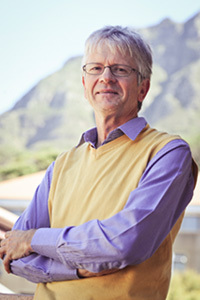International leader at the helm of Energy Research Centre
29 April 2013
Professor Harald Winkler's summary of his vision for UCT's Energy Research Centre could be encapsulated in only seven words, Use less energy, more efficiently, mostly renewables. The centre's new director offers a reflection on the world's energy troubles - and the factors driving climate change. A lead author of the Intergovernmental Panel on Climate Change since 2005, Winkler has a special interest in the area.
The UCT alumnus (he has a PhD from UCT, in addition to an MSc in energy and resources from UC Berkeley, and a BA in sociology and politics from Wits) is internationally renowned for his research work in energy and climate policy. He's also taught and supervised students at postgraduate level since 2000.
The ERC is "unique" in South Africa; a multi-disciplinary academic centre producing high-quality, targeted and relevant research that will articulate precise, practical and progressive alternatives to the energy challenges of South Africa, Africa and beyond. What will it take to imagine a different energy future? Broadly, four things, says Winkler.
Firstly, affordable access to energy is pivotal, especially in South Africa. "This is critical to alleviating poverty and inequality," adds Winkler.
Second, the fuel mix must change; South Africa is too coal-dependent. Diversity is an energy policy goal in its own right, but also critical to the third priority: Reduce greenhouse gas emissions. "Weaning the world off coal and fossil fuels will take decades," he adds. "South Africa is building two new coal-fired power stations to fill energy needs."
But carbon taxes are changing the way the world views fossil fuels and will grease the wheels of transition. Talking to ERC's renewable energy focus, Winkler points out that "huge amounts" of renewable energy sources are available: solar, wind, hydro-electricity, and biofuels among them."And we have the technologies to use them and the economics of many are improving."
And this is where the fourth pillar, improving governance, fits neatly. "An independent system and market operator is a crucial reform for SA's energy sector."
Winkler's vision is that together, doing excellent research on the four broad areas will "add up to imagining a different energy future in our economy and society".
The centre plays an important role in Africa. In 2010 the ERC was selected as Africa's Regional Designated Centre in energy planning, training African energy planners and thereby providing support to African Regional Co-operative Agreement (AFRA) member states. As a result, a "good number" of African energy students are making their way south to UCT.
The centre has also begun a feasibility study on climate change mitigation plans with Latin American and African partners - and partners within UCT, like the African Centre for Cities. This is just a hint of the interdisciplinary work that's growing in the Faculty of Engineering & the Built Environment.
 This work is licensed under a Creative Commons Attribution-NoDerivatives 4.0 International License.
This work is licensed under a Creative Commons Attribution-NoDerivatives 4.0 International License.
Please view the republishing articles page for more information.









